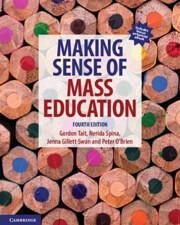
Making Sense of Mass Education
Versandkostenfrei!
Versandfertig in 2-4 Wochen
95,99 €
inkl. MwSt.

PAYBACK Punkte
48 °P sammeln!
Making Sense of Mass Education provides a contemporary analysis of the ideas and issues that have traditionally dominated education research, challenging outdated preconceptions with fundamental theory and discussion. It takes a demythologising approach in assessing these issues and their relevance to schooling and education in Australia. This text examines the cultural context of education and the influence of external media and new technologies, and highlights the many forms of discrimination in education, including social class, race and gender. It looks at alternative approaches to educat...
Making Sense of Mass Education provides a contemporary analysis of the ideas and issues that have traditionally dominated education research, challenging outdated preconceptions with fundamental theory and discussion. It takes a demythologising approach in assessing these issues and their relevance to schooling and education in Australia. This text examines the cultural context of education and the influence of external media and new technologies, and highlights the many forms of discrimination in education, including social class, race and gender. It looks at alternative approaches to education, including the repercussions of gathering data to measure school performance, and considers the intersection of ethics and philosophy in classroom teaching. The fourth edition expands on these issues with three new chapters: on sexuality, children's rights, and neoliberalism and the marketisation of education. Each chapter challenges and breaks down common myths surrounding these topics, encouraging pre-service teachers to think critically and reflect on their own beliefs.


